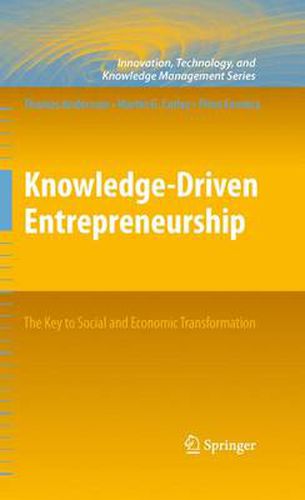Readings Newsletter
Become a Readings Member to make your shopping experience even easier.
Sign in or sign up for free!
You’re not far away from qualifying for FREE standard shipping within Australia
You’ve qualified for FREE standard shipping within Australia
The cart is loading…






This title is printed to order. This book may have been self-published. If so, we cannot guarantee the quality of the content. In the main most books will have gone through the editing process however some may not. We therefore suggest that you be aware of this before ordering this book. If in doubt check either the author or publisher’s details as we are unable to accept any returns unless they are faulty. Please contact us if you have any questions.
The Springer book series Innovation, Technology, and Knowledge Management was launched in March 2008 as a forum and intellectual, scholarly podium for global/local, transdisciplinary, transsectoral, public-private, and leading/ bleeding -edge ideas, theories, and perspectives on these topics. The book series is accompanied by the Springer Journal of the Knowledge Economy, which was launched in 2009 with the same editorial leadership. The series showcases provocative views that diverge from the current conv- tional wisdom, that are properly grounded in theory and practice, and that consider 1 2 the concepts of robust competitiveness, sustainable entrepreneurship, and demo- 3 cratic capitalism, central to its philosophy and objectives. More specifically, the aim of this series is to highlight emerging research and practice at the dynamic intersection of these fields, where individuals, organizations, industries, regions, and nations are harnessing creativity and invention to achieve and sustain growth. Books that are part of the series explore the impact of innovation at the macro (economies, markets), meso (industries, firms), and micro levels. (teams, indi viduals), drawing from such related disciplines as finance, organizational psychology, research and development, science policy, information systems, and 1 We define sustainable entrepreneurship as the creation of viable, profitable, and scalable firms. Such firms engender the formation of self-replicating and mutually enhancing innovation networks and knowledge clusters (innovation ecosystems), leading toward robust competitiveness (E.G. Carayannis, International Journal of Innovation and Regional Development, 1(3), 235-254, 2009).
$9.00 standard shipping within Australia
FREE standard shipping within Australia for orders over $100.00
Express & International shipping calculated at checkout
This title is printed to order. This book may have been self-published. If so, we cannot guarantee the quality of the content. In the main most books will have gone through the editing process however some may not. We therefore suggest that you be aware of this before ordering this book. If in doubt check either the author or publisher’s details as we are unable to accept any returns unless they are faulty. Please contact us if you have any questions.
The Springer book series Innovation, Technology, and Knowledge Management was launched in March 2008 as a forum and intellectual, scholarly podium for global/local, transdisciplinary, transsectoral, public-private, and leading/ bleeding -edge ideas, theories, and perspectives on these topics. The book series is accompanied by the Springer Journal of the Knowledge Economy, which was launched in 2009 with the same editorial leadership. The series showcases provocative views that diverge from the current conv- tional wisdom, that are properly grounded in theory and practice, and that consider 1 2 the concepts of robust competitiveness, sustainable entrepreneurship, and demo- 3 cratic capitalism, central to its philosophy and objectives. More specifically, the aim of this series is to highlight emerging research and practice at the dynamic intersection of these fields, where individuals, organizations, industries, regions, and nations are harnessing creativity and invention to achieve and sustain growth. Books that are part of the series explore the impact of innovation at the macro (economies, markets), meso (industries, firms), and micro levels. (teams, indi viduals), drawing from such related disciplines as finance, organizational psychology, research and development, science policy, information systems, and 1 We define sustainable entrepreneurship as the creation of viable, profitable, and scalable firms. Such firms engender the formation of self-replicating and mutually enhancing innovation networks and knowledge clusters (innovation ecosystems), leading toward robust competitiveness (E.G. Carayannis, International Journal of Innovation and Regional Development, 1(3), 235-254, 2009).